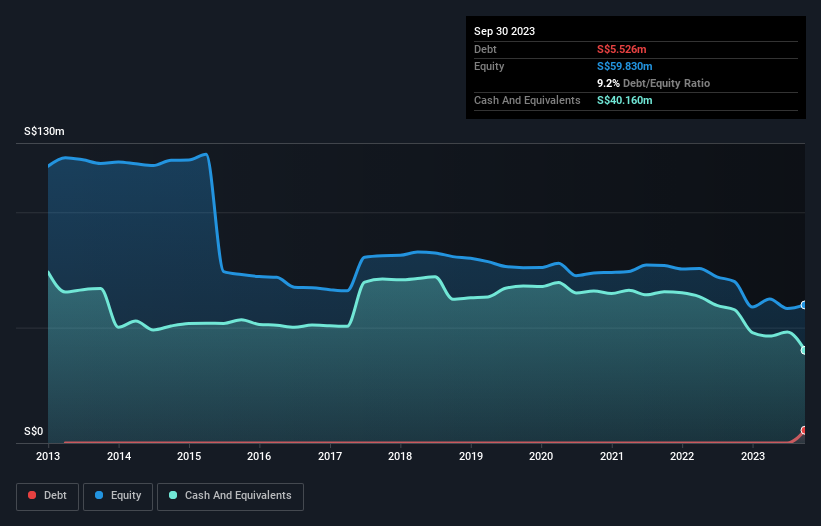
Some say volatility, rather than debt, is the best way to think about risk as an investor, but Warren Buffett famously said that 'Volatility is far from synonymous with risk.' It's only natural to consider a company's balance sheet when you examine how risky it is, since debt is often involved when a business collapses. As with many other companies Lion Asiapac Limited (SGX:BAZ) makes use of debt. But the more important question is: how much risk is that debt creating?
When Is Debt A Problem?
Generally speaking, debt only becomes a real problem when a company can't easily pay it off, either by raising capital or with its own cash flow. In the worst case scenario, a company can go bankrupt if it cannot pay its creditors. While that is not too common, we often do see indebted companies permanently diluting shareholders because lenders force them to raise capital at a distressed price. Of course, the upside of debt is that it often represents cheap capital, especially when it replaces dilution in a company with the ability to reinvest at high rates of return. The first thing to do when considering how much debt a business uses is to look at its cash and debt together.
View our latest analysis for Lion Asiapac
What Is Lion Asiapac's Net Debt?
You can click the graphic below for the historical numbers, but it shows that as of September 2023 Lion Asiapac had S$5.53m of debt, an increase on none, over one year. However, its balance sheet shows it holds S$40.2m in cash, so it actually has S$34.6m net cash.

How Strong Is Lion Asiapac's Balance Sheet?
According to the last reported balance sheet, Lion Asiapac had liabilities of S$11.2m due within 12 months, and liabilities of S$1.65m due beyond 12 months. Offsetting this, it had S$40.2m in cash and S$8.23m in receivables that were due within 12 months. So it can boast S$35.5m more liquid assets than total liabilities.
This surplus strongly suggests that Lion Asiapac has a rock-solid balance sheet (and the debt is of no concern whatsoever). With this in mind one could posit that its balance sheet means the company is able to handle some adversity. Simply put, the fact that Lion Asiapac has more cash than debt is arguably a good indication that it can manage its debt safely. When analysing debt levels, the balance sheet is the obvious place to start. But you can't view debt in total isolation; since Lion Asiapac will need earnings to service that debt. So when considering debt, it's definitely worth looking at the earnings trend. Click here for an interactive snapshot.
Over 12 months, Lion Asiapac reported revenue of S$36m, which is a gain of 49%, although it did not report any earnings before interest and tax. With any luck the company will be able to grow its way to profitability.
So How Risky Is Lion Asiapac?
Although Lion Asiapac had an earnings before interest and tax (EBIT) loss over the last twelve months, it generated positive free cash flow of S$64k. So although it is loss-making, it doesn't seem to have too much near-term balance sheet risk, keeping in mind the net cash. We also take heart from the solid 49% revenue growth in 12 months; undoubtedly a good sign. That growth could mean this is one stock well worth watching. The balance sheet is clearly the area to focus on when you are analysing debt. But ultimately, every company can contain risks that exist outside of the balance sheet. These risks can be hard to spot. Every company has them, and we've spotted 3 warning signs for Lion Asiapac (of which 2 make us uncomfortable!) you should know about.
At the end of the day, it's often better to focus on companies that are free from net debt. You can access our special list of such companies (all with a track record of profit growth). It's free.
New: AI Stock Screener & Alerts
Our new AI Stock Screener scans the market every day to uncover opportunities.
• Dividend Powerhouses (3%+ Yield)
• Undervalued Small Caps with Insider Buying
• High growth Tech and AI Companies
Or build your own from over 50 metrics.
Have feedback on this article? Concerned about the content? Get in touch with us directly. Alternatively, email editorial-team (at) simplywallst.com.
This article by Simply Wall St is general in nature. We provide commentary based on historical data and analyst forecasts only using an unbiased methodology and our articles are not intended to be financial advice. It does not constitute a recommendation to buy or sell any stock, and does not take account of your objectives, or your financial situation. We aim to bring you long-term focused analysis driven by fundamental data. Note that our analysis may not factor in the latest price-sensitive company announcements or qualitative material. Simply Wall St has no position in any stocks mentioned.
About SGX:BAZ
Lion Asiapac
An investment holding company, engages in lime manufacturing, and steel trading activities in Malaysia, Singapore, China, and internationally.
Mediocre balance sheet low.
Market Insights
Community Narratives



